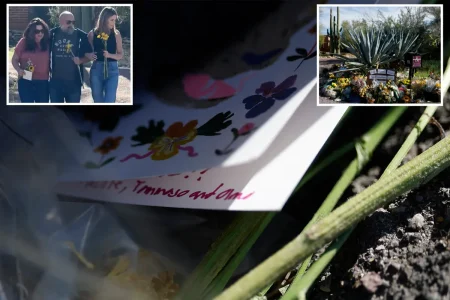Moo Deng, a six-month-old pygmy hippopotamus residing at the Khao Kheow Open Zoo in central Thailand, has become an unlikely national sensation. Her name, meaning “bouncy pork,” belies her current state, which is often one of slumber. Despite her frequent naps, she draws massive crowds of pilgrims, eager to catch a glimpse of the internet-famous hippo. This unexpected celebrity has transformed Moo Deng’s life, exposing her to the adoration and occasional annoyance of a captivated public. From tossed bananas to choruses of her name, Moo Deng navigates the complexities of fame with the placidity characteristic of her species. While her sudden rise to stardom might seem inexplicable, it coincides with a period of political turmoil in Thailand, offering a welcome distraction and a symbol of innocence and joy for a nation weary of societal unrest.
Moo Deng’s popularity transcends national borders, capturing international attention through social media platforms like TikTok. Her charm has resonated with a global audience, propelling her into the spotlight of late-night television and even earning her a coveted Google Doodle. This digital footprint has solidified her position as one of the most searched terms of 2024, a remarkable feat for a young hippo. Her fame even extended into the realm of political satire, with Moo Deng participating in a mock election poll against prominent US political figures, a testament to her widespread appeal. The zoo, capitalizing on this unexpected surge in popularity, has embraced Moo Deng as a brand ambassador, creating merchandise and securing endorsement deals, thereby transforming her into a valuable asset.
The architect of Moo Deng’s online empire is her keeper, Atthapon Nundee, whose strategic use of social media platforms like TikTok and Facebook catapulted her to fame. Mr. Nundee, nicknamed Benz, recognized the potential for virality and carefully curated Moo Deng’s online presence. He had previously experienced smaller successes with other animals under his care, including Moo Deng’s older brother, Moo Toon, and a herd of capybaras, but Moo Deng’s appeal proved unprecedented. With an innate understanding of what captivated online audiences, he captured Moo Deng’s endearing antics, transforming her from a zoo resident into an international phenomenon. His dedication to sharing her charm with the world has garnered him a significant following on social media, further amplifying Moo Deng’s reach.
The Khao Kheow Open Zoo, once a relatively obscure destination, has experienced a dramatic increase in visitors, largely attributed to Moo Deng’s celebrity. This influx of tourists, eager to witness the hippopotamus in person, highlights the power of internet fame and its impact on the physical world. While Moo Deng’s appeal is undeniable, her presence has also raised concerns about the ethical implications of captive breeding programs for endangered species. The pygmy hippopotamus, native to West Africa, is classified as endangered, and while zoos play a role in conservation efforts, the focus on individual animals like Moo Deng can overshadow the broader challenges facing these vulnerable populations. The zoo itself also faces scrutiny, with some exhibits showing signs of neglect, raising questions about the overall welfare of the animals in its care.
Moo Deng’s story is a compelling example of the unpredictable nature of fame in the digital age. From an ordinary pygmy hippopotamus, she has become a symbol of hope and distraction, a testament to the power of cuteness and the internet’s ability to amplify seemingly ordinary moments into global phenomena. While her celebrity brings joy to many, it also underscores the responsibilities that come with such attention, particularly for an endangered species. The zoo’s management faces the challenge of balancing Moo Deng’s popularity with the welfare of all its animals and the broader conservation efforts needed to protect pygmy hippos in the wild.
The contrast between Moo Deng’s placid existence and the frenzy surrounding her is a striking commentary on the human fascination with celebrity, even in its most unexpected forms. While visitors flock to the zoo, captivated by her every move, Moo Deng remains largely oblivious to the commotion, content to nap and occasionally interact with her mother. Her very existence, characterized by simplicity and innocence, offers a respite from the complexities of the world, providing a moment of shared wonder for people from diverse backgrounds. Moo Deng’s story, while seemingly lighthearted, prompts reflection on the nature of fame, the responsibility of zoos in conservation, and the surprising ways in which animals can connect with humans on a global scale.










